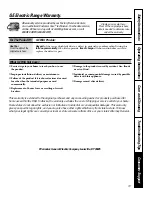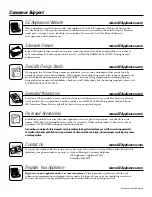
Clean the area under the cooktop often. Built-up
soil, especially grease, may catch fire.
To make cleaning easier, the entire
cooktop may be lifted up and supported
in the up position.
Be sure all the surface units are turned
off before raising the cooktop. The
surface units and drip pans do not need
to be removed; however, you may remove
one to make raising the cooktop easier.
A support rod will hold the cooktop up
while you clean underneath it.
After cleaning under the cooktop with
hot, soapy water and a clean cloth, lower
the cooktop. Be careful not to pinch
your fingers.
21
Safety Instructions
Operating Instructions
Care and Cleaning
Tr
oubleshooting T
ips
Consumer Support
www.GEAppliances.com
Be sure the controls are turned to OFF and the surface units are cool before attempting to remove them.
Surface Units
To clean the surface units, turn the
control to the highest setting for a
minute. The coils will burn off any soil.
To remove a surface unit:
To remove the drip pans for cleaning,
the surface units must be removed first.
Push the surface unit back toward
the receptacle to free the locking
tab from the cooktop.
Lift the surface unit about 1 inch
above the drip pan and pull it out.
Do not lift the surface unit more than 1 inch.
If you do, it may not lie flat on the drip pan
when you plug it back in.
NOTE:
Repeated lifting of the surface unit
more than 1 inch above the drip pan can
permanently damage the receptacle.
To replace a surface unit:
Replace the drip pan into the recess
in the cooktop. Make sure the
opening in the pan lines up with
the receptacle.
Insert the terminals of the surface
unit through the opening in the
drip pan and into the receptacle.
Push the surface unit in and down
to lock the tab in place so it rests
evenly in the cooktop.
Do not immerse the surface units in liquids of
any kind.
Do not clean the surface units in a dishwasher.
Do not bend the surface unit plug terminals.
Do not attempt to clean, adjust or in any way
repair the plug-in receptacle.
Drip Pans
Remove the surface units. Then lift out
the drip pans.
Place them in a covered container. Add
1/4 cup ammonia and let soak several
hours or overnight. Wash, rinse well
and dry.
The drip pans may also be cleaned in a
dishwasher.
Clean the area under the drip pans
often. Built-up soil, especially grease,
may catch fire.
Do not cover the drip pans with foil. Using foil so
close to the receptacle could cause shock, fire or
damage to the range.
Surface unit
Drip pan
Receptacle
Locking
tab
Locking tab
Drip
pan
Cooktop
rim
When properly seated, the locking
tab should lock onto the cooktop rim
through the notch in the drip pan.
Surface
unit
Locking tab
Lift-Up Cooktop
Be sure all surface units are turned
off before raising the cooktop.
Support rod












































